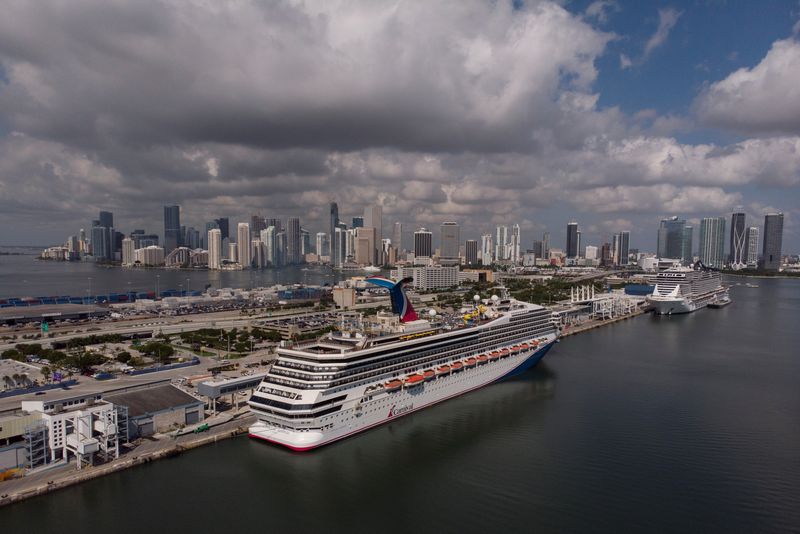By Ananya Mariam Rajesh and Doyinsola Oladipo
(Reuters) - Carnival (NYSE:CCL) Corp on Friday forecast a loss in the fourth quarter after it reported results for the third quarter that fell well short of Wall Street estimates, as higher fuel prices and cheaper fares offset a rise in bookings.
Shares of Carnival plunged 20% to $7.33 per share in midday trading, falling to nearly a 30-year low.
High inflation has further hit cruise operators that have been running at a loss since the COVID-19 pandemic took hold in 2020 for an array of reasons including lockdowns, bans on cruises, safety issues and labor shortages. Even so, travel is bouncing back as COVID-19 restrictions are lifted.
"Since announcing the relaxation of our protocols last month, we have seen a meaningful improvement in booking volumes and are now running considerably ahead of strong 2019 levels, Carnival Chief Executive Officer Josh Weinstein said.
The company said revenue increased by nearly 80% in the third quarter of 2022 compared to second quarter 2022 but revenue per passenger cruise day for the third quarter of 2022 decreased compared to a strong pre-pandemic 2019.
"While there have been other headwinds to building occupancy, e.g. restricted protocols, I think inflation and consumer constraints (are) also having an impact as well - particularly the mass market," M Science analyst Michael Erstad said.
Adding to its challenges, Carnival has been heavily discounting and ramping up advertisements to attract passengers after a long pandemic-led interval.
The cruise operator said it expects eight of its nine brands to have their entire fleet serving passengers by the end of the fourth quarter of 2022.
The company said it also expects pricing to increase in 2023.
Carnival said it expects break even to slightly negative adjusted earnings before interest, taxes, depreciation and amortization for the fourth quarter ending Nov. 30.
Similarweb (NYSE:SMWB) travel and leisure analyst Jim Corridore said the downward revision to the fourth quarter is likely related to rising costs to restart operations, supply chain issues and likely higher labor, food and fuel costs.
The cruise operator's cumulative advance bookings for the current quarter are below the historical range and at lower prices.

Carnival's revenue in the third quarter ended Aug. 31 rose to $4.31 billion from $546 million a year earlier, but missed analysts' average estimate of $4.90 billion, according to IBES data from Refinitiv. Net loss narrowed to $770 million, or 65 cents per share, from $2.84 billion, or $2.50 per share, a year earlier.
Excluding items, Carnival had a loss of 58 cents per share, well above analyst consensus for a loss of 15 cents per share, according to IBES.